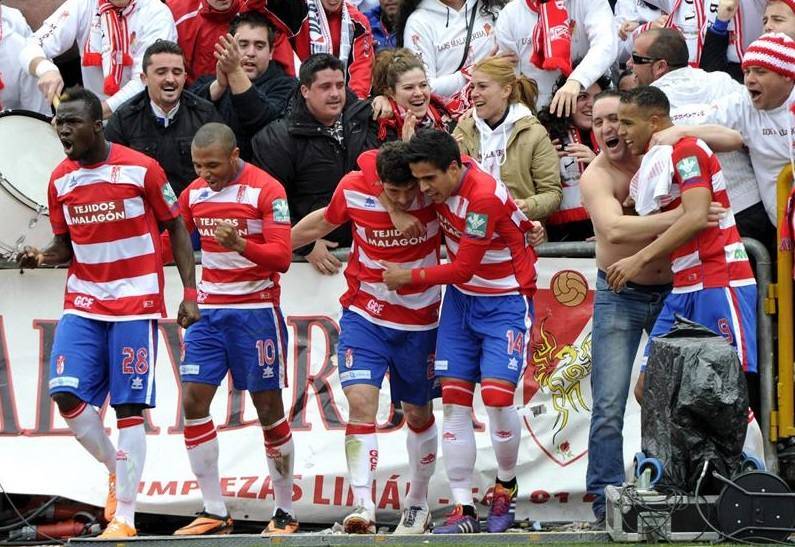Contenidos
Los sevillanos son beticos
boom: los béticos de don manué
¿Quién o qué es el Real Betis Balompié? Un equipo de fútbol de Sevilla, España. Hay dos clubes importantes en la ciudad -el Betis y el Sevilla Fútbol Club- y los sevillanos (gente de aquí, en contraposición a los sevillistas, seguidores del Sevilla FC) se enorgullecen, con razón, de ser el único lugar de España con una rivalidad entre ciudades (más o menos) igual.
El Real Betis Balompié («Real» significa real, «Betis» deriva de la palabra romana que designa al río Guadalquivir, y «Balompié» es la palabra arcaica, no anglicista, que designa al fútbol) juega a rayas verdes y blancas -el color de la bandera andaluza- y por eso se le conoce como los verdiblancos. Tras descender en mayo de 2009 por un solo gol, y no conseguir el ascenso un año después por un solo punto, terminaron la temporada 2010/11 como campeones de la Liga Adelante (habitualmente conocida como Segunda), y su primera campaña de vuelta en Primera en la 13ª posición. En la 2012/13, la tercera bajo el mando de Pepe Mel, terminaron en séptima posición y se clasificaron para Europa por primera vez en ocho años. No en vano, también quedó por encima del Sevilla FC por primera vez en ese periodo.
sevillian derby according to canal + (02-05-2012) sevilla 1-2 real
Luna (Girona) The Nervionense youth player, champion of the Copa del Rey in 2010, has arrived this season at Girona after a long career: Almeria, Mallorca, Aston Villa, Hellas Verona, Spezia, Eibar, Levante and Rayo Vallecano.
Bernardo (Girona) After working his way up to the first team of Sevilla FC, whose first team he was part of in 12/13, the Spanish-Colombian center back was loaned first to Racing and then to Sporting. He is now in his second spell at Montilivi, after spells at Middlesbrough and Espanyol.
Ariday Cabrera (Las Palmas) The winger from the Canary Islands joined Betis B in the 12/13 winter transfer window, coming from Girona, and then moved to L’Hospitalet, Sabadell, Huracán, Valencia Mestalla, Cultural Leonesa, Mallorca and Las Palmas.
José María Amo (Ponferradina) The central defender from Las Pajanosas, U21 international, was one of the most promising players of the Sevilla youth team, despite serious injuries. In this past market he finished his contract and left for free. UES
Álvaro García (Rayo Vallecano) Although he later sounded for Sevilla FC and Betis, the player from Utrera did not play in any of their youth teams. From Utrera he went to San Fernando and the Granada youth team until he ‘exploded’ in Cadiz, who transferred him for 4.5 million. UES
the day after (15/06/2020): the eye of the sevillian derby
In the times of «la gloriosa», a lawyer, Don Antonio Moreno Sevillano, was president. After the war, the tradition of illustrious surnames returned to the presidency: Don Alfonso Alarcón De la Lastra, Don Francisco Cantalapiedra y Fernández De Toledo, Don Eduardo Benjumea Vázquez-Armero.
Thus arose the chilling cry that in five words sums up everything that can be said, in a pondering or analytical sense, of their titanic effort: «Viva er Betis manque pierda» (4) Del Arco-chapter XV: «A mal tiempo buena cara», pages 186-187.
But it seems that the «manque pierda» is imported. This «manque» for «aunque» there is no one in Seville who says it for Seville, not even in the most slangy speech of the Pumarejo or the Cava de los gitanos.
All in all, something remains of the myth. There are those who continue to unite superstition and hobby. One of the most picturesque guys in the Betic sociology is Antonio Moguer Márquez, «el chato Moguer», in a booklet entitled «Minibiography and «other things» of a happy Betic», which he spread in the field last League writes:
we relive the best of the derbies between sevilla and betis!
Betis and Sevilla drew 1-1 in the Villamarin derby, where Betis showed more ambition and a great improvement against their eternal rivals, who were perhaps too conservative and in which the Moroccan Yassine Bono prevented the local triumph by saving a penalty from the French Fekir a quarter of an hour from the end.
After a first half with few chances, although with a greater Green-White push, Sevilla, very wary, took the lead after 48 minutes with a goal by Suso neutralized five minutes later by Sergio Canales’ equalizer in a penalty protested for rigorous by the Sevillistas, after which Betis had another cartridge, but Bono, masterful, stopped another penalty to Fekir.
With a lot of caution on both sides, which is typical in a duel of maximum Sevillian rivalry, and especially on the part of a Seville more shy than usual, the clash began even and intense in a first half with very few chances, although with a greater thrust of the green and whites.
The Chilean Manuel Pellegrini’s team pressed more in the middle, with the Argentine Guido Rodríguez and Canales, helped by Ruibal and Lainez, imposing themselves on Jordán, Gudelj and Óliver Torres, who were very grey, and the local pressure led to good, although isolated, arrivals by Betis, with the Mexican Lainez especially active.

